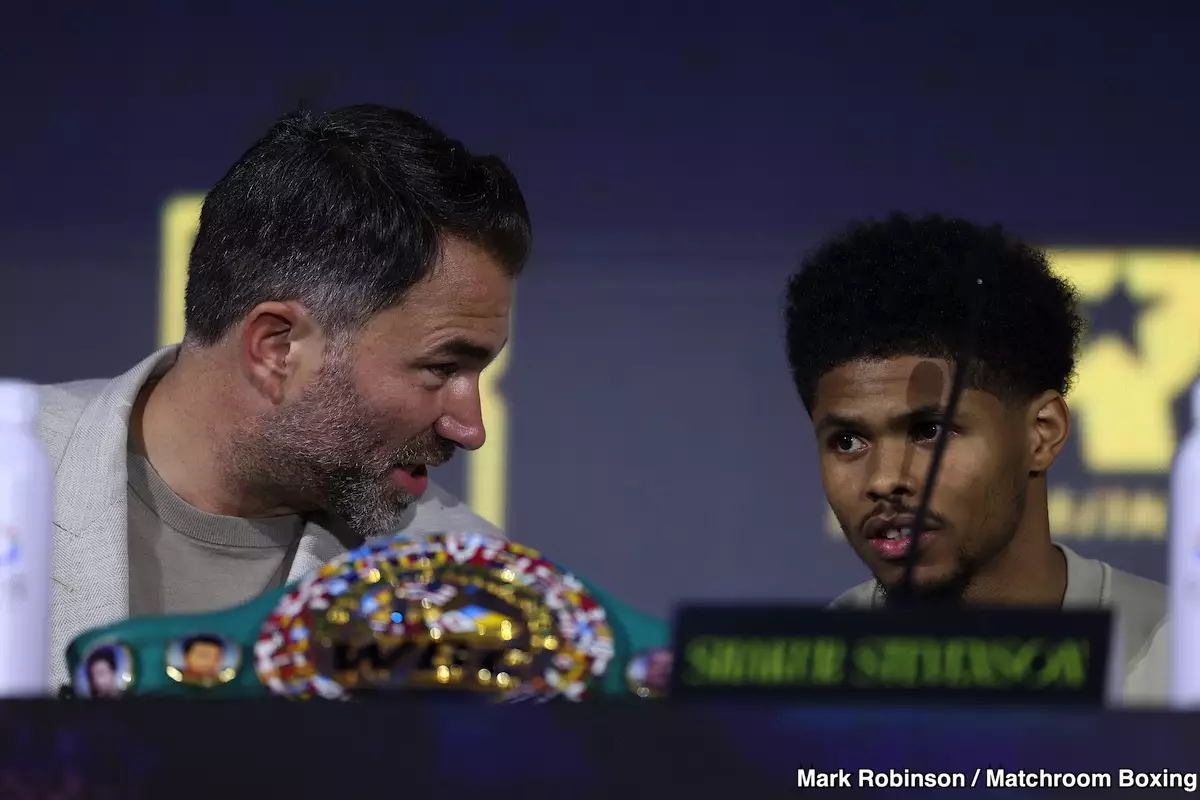The world of boxing often thrives on narratives, and few figures understand this better than promoter Eddie Hearn. As he prepares to market Shakur Stevenson’s upcoming fight against Josh Padley on February 22nd in Riyadh, Hearn has drawn a strikingly bold comparison—likening Stevenson to the legendary Sugar Ray Leonard. This assertion raises a number of questions about both the merits of such comparisons and the actual accomplishments of Stevenson thus far in his career.
At 27 years old with a record of 22 wins, 0 losses, and 10 knockouts, Shakur Stevenson is certainly a talented boxer. However, comparing him to Sugar Ray Leonard—a figure revered not just for his boxing skill but also for his incredible fights against elite opponents including the likes of Roberto Duran and Marvin Hagler—seems overly ambitious. Leonard’s tenure was marked by a series of high-profile, exhilarating bouts that captivated audiences and left a lasting legacy in the sport. Meanwhile, Stevenson’s resume reflects a different trajectory, one that, as of now, does not include fights against fully established top-tier competitors.
Leonard’s career was punctuated by a willingness to face the toughest challenges, something that Stevenson has yet to fully demonstrate. During his latter twenties, Leonard was already involved in some of boxing’s most exhilarating matchups. The gulf in competition faced by the two fighters at similar ages raises skepticism about Hearn’s bold claims regarding Stevenson’s potential greatness.
Eddie Hearn has consistently pushed the narrative that Stevenson embodies greatness, even dubbing him one of the greatest pound-for-pound fighters currently active. Such grandiose claims, while certainly beneficial for ticket sales and PPV purchases, beg the question of whether they are reflective of actual boxing merit or simply promotional flair. Hearn’s promotional instincts lead him to tout Stevenson’s achievements; his title as a three-division champion is impressive, yet the context behind those titles cannot be ignored.
Hearn’s affirmation that Stevenson “hasn’t even scratched the surface in terms of his ability” feels more like a marketing ploy than an objective assessment of his boxing prowess. It’s crucial to differentiate between promotion and factual analysis. Stevenson’s upcoming fight against replacement opponent Josh Padley, who has a record of 15 wins and 4 knockouts, does little to suggest that he is truly stepping into the ring with a formidable foe. Instead, this match could easily become a platform for Hearn to tout Stevenson’s skills without offering genuine competitive challenges.
Much of what Hearn suggests hinges on the principle of legacy. The world of boxing is unforgiving—fighters are often judged according to their legacy, made up of both their victories and the caliber of their opponents. In this regard, one cannot help but wonder how Stevenson can carve out a legacy comparable to that of iconic figures like Leonard. The reality is that engaging with lesser-known or less-respected fighters dilutes one’s potential narrative in the larger boxing ecosystem.
The fact that Stevenson has not actively pursued bouts against more renowned opponents raises the question of whether his current trajectory is truly deserving of Hearn’s lofty comparisons. While it is undeniable Stevenson may possess technical skill, mastery of agility, and the potential for greatness, it can be argued that without facing the elite of the sport, comparing him to someone like Leonard undermines the very essence of what makes a champion. Greatness is often earned against great challenges, and until Stevenson confronts such opponents, the weight of Hearn’s analysis may remain wishful thinking rather than reality.
To conclude, the boxing community stands at a crossroads between promotion and authenticity. Eddie Hearn’s fervent endorsements of Shakur Stevenson as another Sugar Ray Leonard represent a grave misalignment with actual boxing lore. As boxing enthusiasts, we owe it to the sport to demand not just hype, but substantial evidence of greatness. Until Stevenson commits to facing tougher opponents and proving himself in the ring, the comparisons made by Hearn will remain just that—comparisons without the substance that true greatness demands.


Leave a Reply